My copy of the set is unfortunately a little the worse for wear, as you might be able to see in the pictures above and below. I've previously commented that of the multitude of used sets that I've purchased over the years the Harry Potter sets almost invariably seem to be the shabbiest, and this one is no exception. The front of the box features the set contents superimposed on a remote-looking landscape; an almost unfeasibly young-looking Daniel Radcfliffe a.k.a. Harry Potter gazes out from the bottom right corner, and the box also features a scroll carrying the 8-12 age recommendation and Harry Potter theme branding including the distinctive movie font. The back of the box (below - click to enlarge) is notable for a couple of panels containing alternate builds, something you'll generally only see gracing the packaging of Creator 3-in-1 and some Technic sets these days.
The cover of the instruction booklet (below - click to enlarge) is similar to the front of the box, although the picture of the set contents is more neatly framed and the age recommendation and picture of the youthful Harry Potter are absent.
The back cover (below) contains advertising for a selection of first wave Harry Potter sets from 2001 and 2002. When you see the sets laid out this way it's a reminder that they're supposed to come together to make a mega-Hogwarts campus; I particularly like the way that different sets are designed to be combined to create larger and more impressive buildings, for instance elements of Set 4730 The Chamber of Secrets forming a subterranean level beneath Set 4709 Hogwarts Castle and also providing Set 4733 The Dueling Club with a roof - very neat. Having managed to aquire most of the first wave sets, I've been promising myself for years now that I'll build and suitably arrange them, but so far I've not got round to it. One day....
In addition to 54 pages of building instructions and a couple of pages of advertising, the single instruction booklet also contains three pages which illustrate some of the set's play features, and five pages of alternate builds such as the serpent, or maybe it's a Basilisk, below (click to enlarge). With respect to the building guide itself, it takes a few moments to figure out the blacks from the dark greys from the light greys but once you've worked that out the instructions are easy to follow despite the lack of part call-outs.
The set was released in 2002, back in the days before LEGO switched light grey, dark grey and brown elements to their modern light bluish grey, dark bluish grey and reddish brown equivalents. You can see a selection of the rarer elements contained within the set in the photograph below (click to enlarge). A few of them - the dark grey dragon wing, horse battle helmet and scorpion, and the trans-purple printed 4 x 4 dish - are unique to this set. Others such as the brown torch and printed brown 1 x 4 x 3 panel, the dark grey 1 x 12 x 3 arch, the light gray modified 4 x 10 brick with cut corners and 4 x 4 x 6 quarter cylinder with stone wall pattern, and the printed sand green 2 x 2 x 2 box door, have only ever appeared in this set and one other. Other notable elements include the sand green 6 x 8 x 9 tower roof which has only appeared in 5 sets, most recently the fourth version of Hogwarts Castle released in 2011, and the sand green 1 x 2 tile with grille which has surprisingly only ever appeared in 3 sets including this one.
The set contains 3 minifigures, the first of which is Harry Potter (below - click to enlarge). This version of the Harry Potter minifigure, in which he wears his school uniform, has appeared in a total of 8 sets released in 2001 and 2002. The torso, which isn't back-printed, features a prominent Gryffindor shield print; it's fairly simple by today's standards and it's shared with a number of other minifigures including versions of Ron Weasley and Hermione Grainger. Harry's black cloak with star pattern is exclusive to the first wave Harry Potter sets where it's worn by a variety of different characters. His light grey legs are generic and unprinted and his hair is similarly ubiquitous. Harry's single-sided face print, featuring his round spectacles plus the trademark red Lightning Bolt scar on his forehead, has graced a total of 14 different versions of the Harry Potter minifigure.
The version of Albus Dumbledore in this set (below) has appeared in a total of four sets released between 2001 and 2002. The single-sided torso print and printed legs are unique to this minifigure in purple, although the same prints have also appeared on a light purple torso and legs in a different version of the Dumbledore minifigure. His beard and hair are commonly available elsewhere, but his single-sided head print has only graced three minifigures, all of them versions of Dumbledore, and it only appears printed on a yellow head in this one set. His purple fabric cape has seen better days and it's exclusive to this minifigure.
The third minifigure is Professor McGonagall (below), and it's one of only two minifigure versions of Minerva McGonagall ever produced. This version of the minifigure has only appeared in this set plus a rare promotional set apparently distributed exclusively in Hong Kong. Minerva's printed skirt, made up of a 65 degree 2 x 2 x 2 slope, and her printed torso, are predictably unique to this figure, as is her single-sided head print. Her green wizard hat is rarer than I expected, having only appeared as a part of this minifigure and one other, while her green cape has graced a total of six minifigures to date.
Once the minifigures have been assembled it's time to get to work on Dumbledore's Office itself. First to be constructed is the lower part of the structure. A defining feature is that the different sections are connected by hinges meaning that the building can be opened up to allow access to the interior. You can see the lower part of the structure opened up below (click to enlarge). This reveals some of the interior features such as the prominent spiral staircase and a rotating bookcase and safe. Looking at the picture below, I'm immediately struck by the similarity to the Star Wars Jabba's Palace set that I reviewed back in April of 2013 in terms of the overall configuration and colour scheme.
You can see the lower part of Dumbledore's Office closed up below (click to enlarge). When the structure is closed a visitor is faced with an imposing facade which features a pair of dragon wings and horse head armour. The two halves are held in the closed position by a 'key' consisting of a scorpion attached to a couple of Technic axles - a nice touch! I'm a fan of the sand green detailing which brings to mind the recent Lord of the Rings and Hobbit sets.
The rear of the lower part of the structure is shown below (click to enlarge). The central section of wall featuring the trans-purple bricks is hinged at the top and can be raised to reveal a secret passage at the base of the spiral staircase.
With the lower section completed we now move on to construction of the upper section. Once again this section opens up via the use of hinges to reveal the interior which can be seen in the picture below (click to enlarge). The interior features a number of play features, most notably a brown panel in the back wall which is printed to look like a cabinet containing potions and which rotates about its axis to reveal a shiny gold key. There's also a chair which rotates and a small brown table, the top of which lifts up to reveal a secret compartment.
The interior is still visible when the structure is closed (picture below - click to enlarge). The printed trans-purple dish at the base of the roof is attached to a simple mechanism whereby turning a knob at the back of the structure makes the dish and the trans-red, blue and yellow elements above it rotate.
You can see a rear view of the upper section below (click to enlarge). If you look closely at the area beneath the small arched window you can see a sand green cone poking out; it's this that you turn in order to rotate the trans-purple dish inside. You can also see the back of the revolving potions cabinet mentioned earlier which has the gold key attached to it.
The completed upper and lower sections stack as you can see below, reaching a total height of almost 40 cm. The top section is set back a little from the lower section, and the spiral staircase winds upwards towards the floor of Dumbledore's inner sanctum; the steps stop short, however, and there's an untidy-looking gap between the upper and lower sections.
The completed structure also looks rather untidy from the back (below), with an ugly gap again visible between the upper and lower sections. The unfinished feel is accentuated by the fact that the light grey curved panels at the rear are unprinted.
You can see the finished model below complete with minifigures (click to enlarge); for all my complaints about the lack of polish I think that Dumbledore's Office really comes into its own when viewed from the front with both levels opened up and the various play features revealed.
I think it's fair to say that this set is aimed squarely at the younger builder with play in mind rather than AFOLs looking to display the finished model. On the one hand the build undoubtedly has a crude, unfinished feel to it, with jarring gaps between the upper and lower levels and beneath curved panels and fence sections. There's also a preponderance of large elements and a few dubious colour choices. The flipside of the coin is that as a play set there's a lot to like thanks to a generous selection of play-features including the ability to open up the model and a number of mechanisms, secret compartments and passages to explore.
Set 4729 Dumbledore's Office contains 446 pieces and was released in 2002 with a recommended retail price of £44.99 / US$50. I picked up my used, boxed copy of the set from eBay back in 2009 for a little over £10 plus shipping; a quick look at eBay now suggests that you'll be looking at nearer £50 / US$70 for a boxed example these days, with similar prices to be found on Bricklink, although you'll be able to get it cheaper if you're willing to forego the box. Definitely one for collectors rather than builders, I'd say.

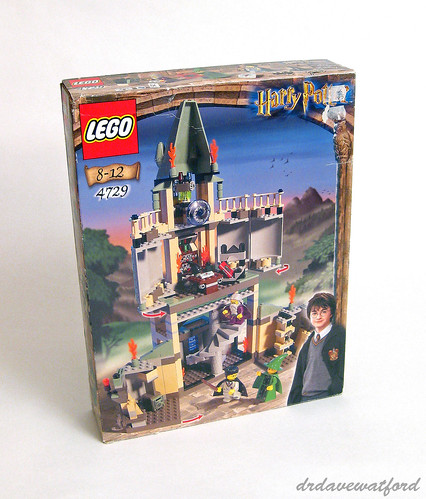
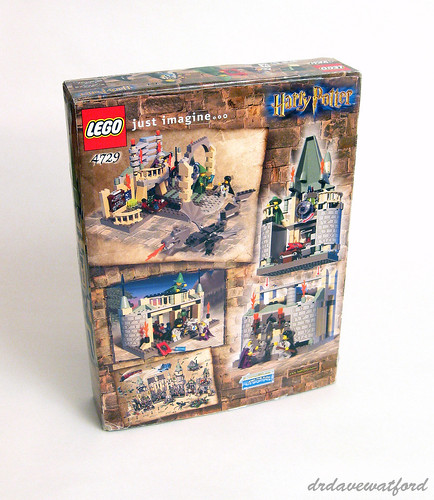
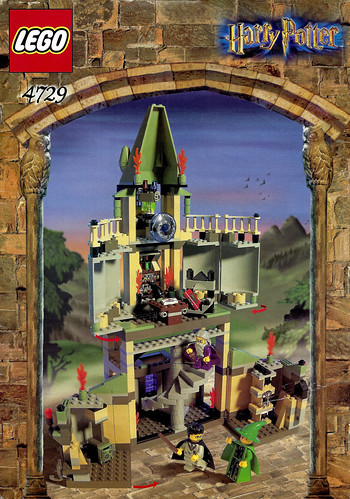
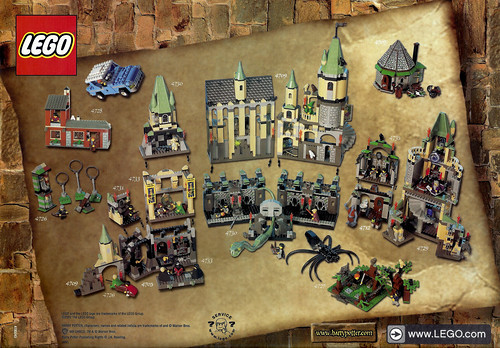


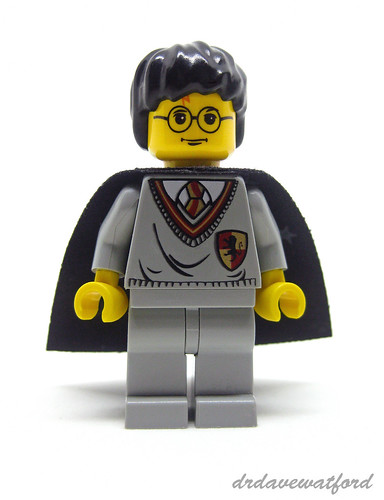
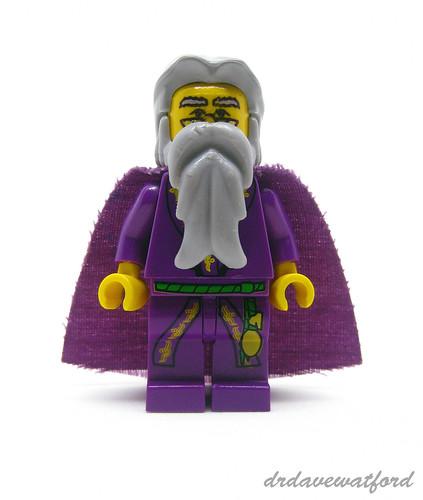
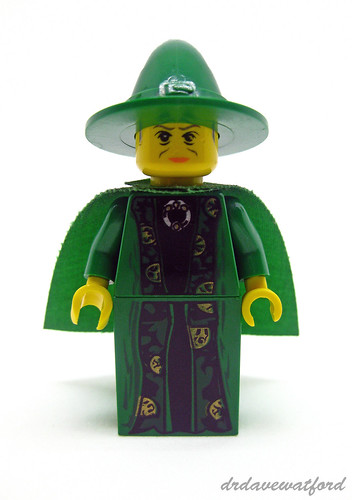
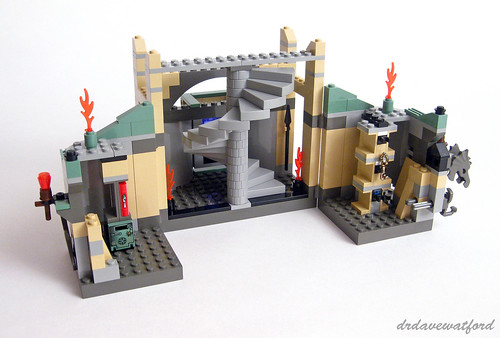
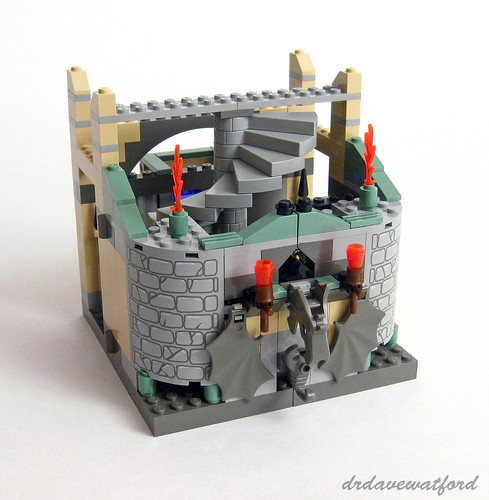
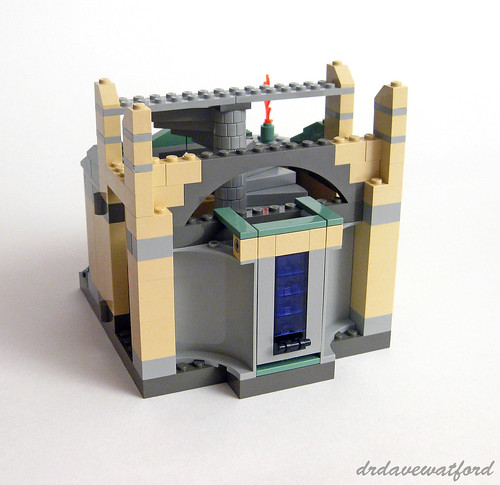
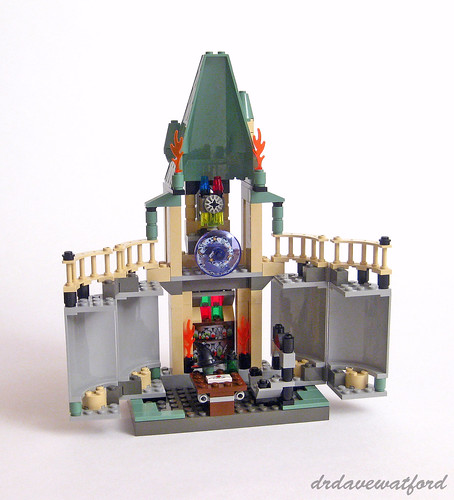
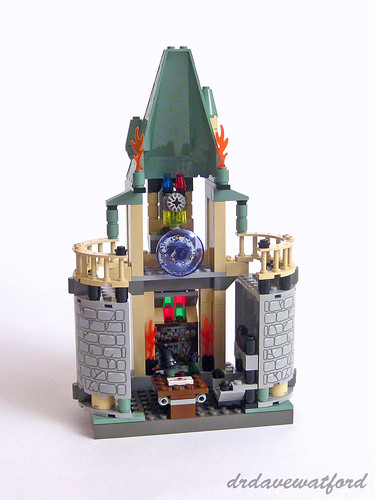


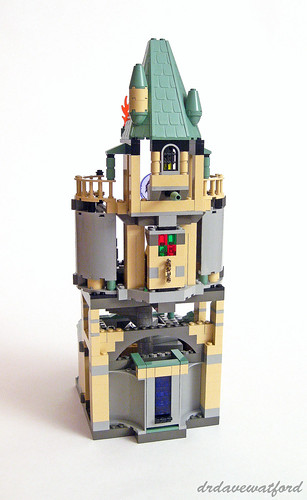
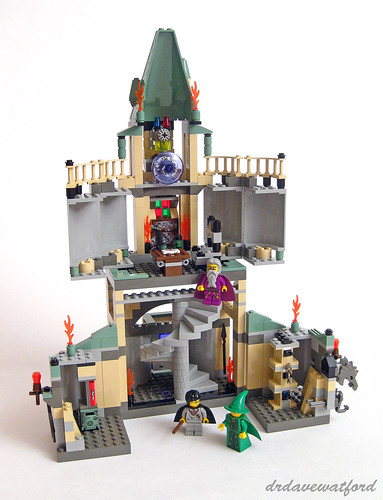
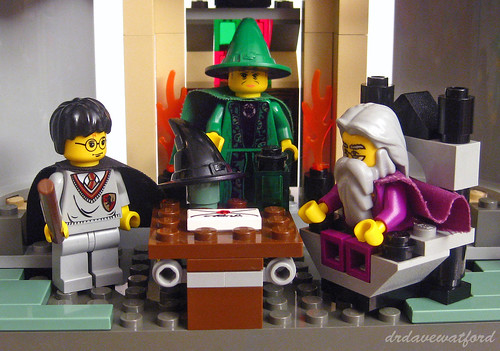
No comments:
Post a Comment